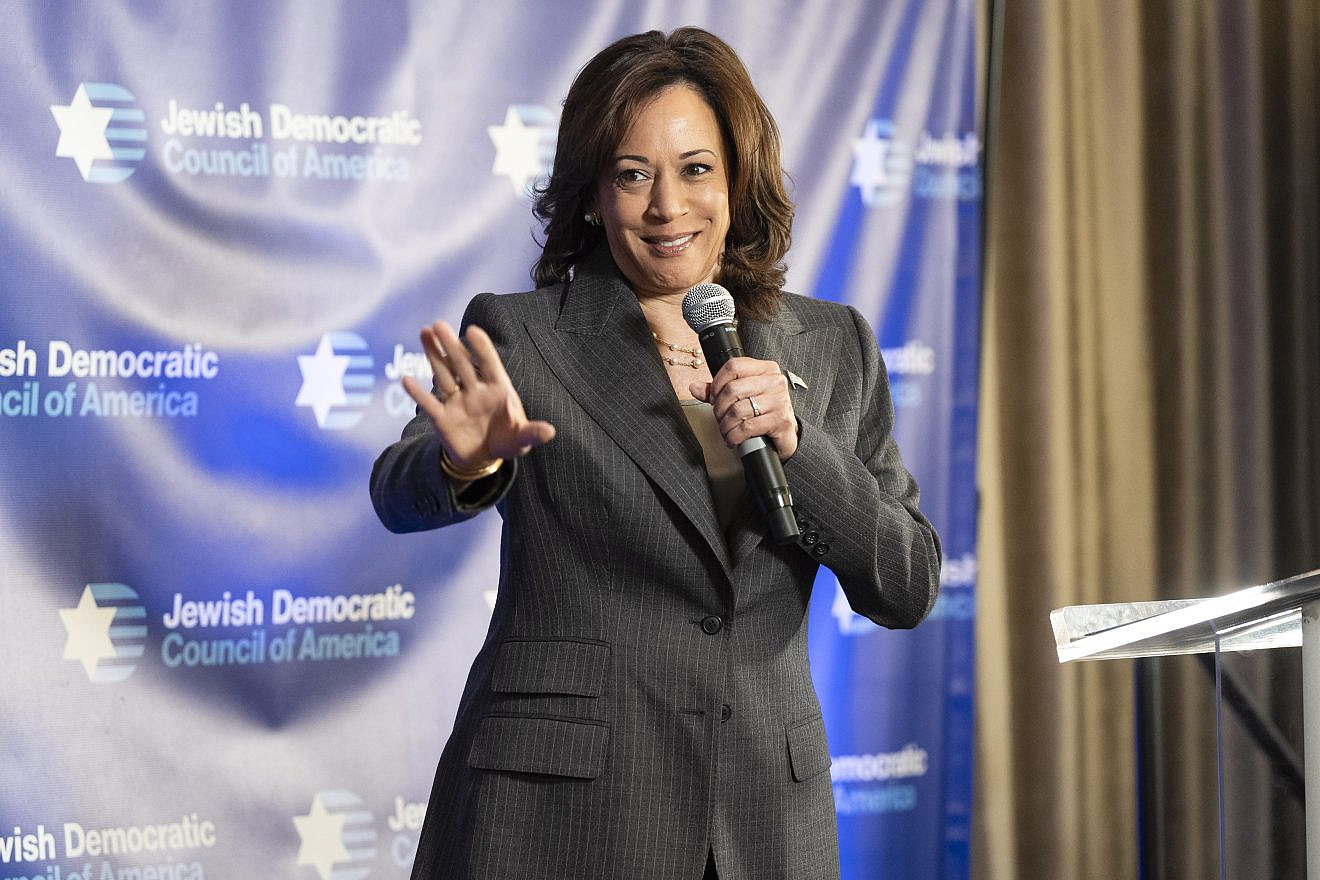On Sunday evening, President Biden announced that he would not pursue reelection. In a subsequent tweet, he offered his “full support and endorsement” for Kamala Harris’ Democratic presidential nomination. The announcement shifted the focus onto the vice president, making many wonder what her policies would be.
Vice President Kamala Harris’s political trajectory has increasingly aligned with the anti-Israel and pro-Palestinian Democratic voices in the party’s progressive wing. This shift has raised concerns among Israel’s supporters about the erosion of bipartisan support for the Jewish state in American politics.
This was emphasized when Minnesota Rep. Ilhan Omar responded by immediately endorsing Harris for president. Omar is notoriously anti-Israel and anti-Semitic. Alexandra Ocasio-Cortez, Cori Bush, Ayanna Pressley, and other members of the ultra-left wing “squad” quickly followed suit.
Thank you, Mr. President.
— Ilhan Omar (@IlhanMN) July 21, 2024
This was the president’s decision to make and I’m grateful for his years of service to our country.
Thrilled to support @KamalaHarris as our Democratic nominee and remain committed to working alongside her to defeat Donald Trump in November. https://t.co/e9wcYkkopA pic.twitter.com/GJA4Ujs9ua
Noticeably absent was an endorsement from Rep. Rashida Tlaib, the only Palestinian member of the House of Representatives. In a statement, Tlaib said she was “eager” to speak to Harris about a permanent ceasefire and “an end to the funding of genocide in Gaza.” Tlaib is the most extreme of the squad when it comes to hating Israel. In the fall, she was censured by Congress for statements calling for the destruction of Israel.
Harris’s evolution on Israel-related issues became particularly noticeable during her presidential campaign and has continued into her vice presidency. While she maintains a veneer of support for Israel’s security, her actions and statements often seem more focused on appeasing the growing anti-Israel sentiment within the left wing of her party.
The Democratic party shifted focus from President Biden to his former running mate. As his term nears completion, it is a painful reminder that Biden has yet to invite Prime Minister Netanyahu to the White House. Harris recently announced that she will not attend when Netanyahu addresses at a joint session of Congress. Politico reported that the VP does plan on having a face-to-face meeting with the Israeli prime minister, perhaps even at the White House.
Politico also reported that the VP has challenged her boss to be more sympathetic to the Palestinians, saying that she believes the United States should be “tougher” on Israeli Prime Minister Benjamin Netanyahu.
Harris called on Israel to “do more” to ensure the delivery of aid, including by opening additional land crossings into Gaza, adding that there can be “no excuses” in this regard. It should be noted that reports revealed that Israel was delivering sufficient aid to Gaza, but it was not distributed after crossing the border.
On behalf of the American people, I thank Joe Biden for his extraordinary leadership as President of the United States and for his decades of service to our country.
— Kamala Harris (@KamalaHarris) July 21, 2024
I am honored to have the President’s endorsement and my intention is to earn and win this nomination.
It was also Harris who convinced the president to condemn Islamophobia at the same time as he spoke out against anti-Semitism in his post-October 7th address.
Her personal life became a possible reflection of this policy when her stepdaughter, Ella Emhoff, posted a link to UNRWA’s English-language fundraising page on her personal Instagram. UNRWA has long faced international criticism for its close ties to Hamas. Ella is the daughter of Doug Emhoff. According to Jewish law, Ella is not Jewish as her mother, Kerstin, is not Jewish.
One of Harris’s most glaring examples of apparent capitulation to anti-Israel elements occurred in September 2021 at George Mason University. When a student accused Israel of “ethnic genocide,” Harris not only failed to challenge this inflammatory and false accusation but appeared to validate it by responding, “Your voice, your perspective, your experience, your truth should not be suppressed.” This incident sent shockwaves through the pro-Israel community, who expected the Vice President of the United States to reject such a blatant distortion of reality.
Harris’s rhetoric surrounding the Israel-Hamas conflict following the October 7, 2023 attacks has also been a source of concern. While initially expressing strong support for Israel’s right to defend itself, her messaging quickly shifted to emphasize Palestinian civilian casualties, echoing talking points often used by Israel’s detractors. After the IDF rescued four hostages in a daring rescue In November 2023, she stated, “Too many innocent Palestinians have been killed,” without adequately contextualizing the complex realities of urban warfare against a terrorist organization that deliberately embeds itself within civilian populations. She opposed Israel’s incursion into Rafah, a necessary step in neutralizing the threat of Hamas.
In her contacts with Palestinian President Mahmoud Abbas, she expressed support for a “two-state solution” and criticized “settler violence.”
A two-state solution would create an unprecedented weaponized Arab state inside the boundaries of Israel that has been ethnically cleansed of Jews, with its capital in an exclusively Muslim Jerusalem.
The Vice President’s strong and vocal support for the Iran nuclear deal further illustrates her alignment with left-wing positions that many pro-Israel advocates view as detrimental to Israel’s security. Despite Israel’s vehement opposition to the Iran deal, Harris has consistently supported it, seemingly prioritizing diplomatic engagement with a regime that repeatedly calls for Israel’s destruction.
Her support of the Islamist regime in Iran was also on display in 2020 when she attacked President Trump for ordering a drone strike that took out Qassam Soleimani, an Iranian terrorist with the blood of hundreds of American soldiers on his hands,
Harris’s criticism of Israeli settlements in the West Bank, while not unique among American politicians, often lacks nuance and fails to acknowledge the complex historical and security considerations involved. Her characterization of settlements as a primary obstacle to peace echoes the rhetoric of far-left groups that seek to delegitimize Israel’s presence in disputed territories.
Moreover, Harris has been noticeably silent on the rise of antisemitism within her own party. The “Squad” members of Congress, including Representatives Ilhan Omar and Rashida Tlaib, have made numerous statements that many consider antisemitic, yet Harris has not publicly challenged these colleagues. Some interpret this silence as tacit approval or, at best, a reluctance to confront anti-Israel sentiment within her party’s ranks.
The Vice President’s approach to Israel-related issues seems increasingly influenced by intersectional politics, a framework that often portrays Israel as an oppressor and Palestinians as uniformly oppressed. This oversimplified view fails to account for the complexities of the conflict and the genuine security concerns faced by Israel.

Harris’s engagement with progressive Jewish groups that are often critical of Israel, such as J Street, while maintaining distance from more mainstream pro-Israel organizations, further illustrates her tilt towards the left on Israel-related issues. This selective engagement sends a clear message about which voices she prioritizes within the American Jewish community.
From a pro-Israel perspective, Harris’s evolving stance is part of a broader and profoundly concerning trend within the Democratic Party. The party that was once unequivocally supportive of Israel now harbors a growing faction that views the Jewish state with skepticism or outright hostility. Harris, as a prominent figure and potential future presidential candidate, is catering to this faction at the expense of the strong U.S.-Israel relationship.
Critics argue that by pandering to anti-Israel elements, Harris is not only undermining bipartisan support for Israel but also potentially encouraging those who seek to delegitimize the Jewish state. Her approach risks normalizing extreme views on Israel within mainstream Democratic politics.
While Kamala Harris maintains a rhetorical commitment to Israel’s security, her actions and statements increasingly align with the anti-Israel sentiments prevalent in the left wing of the Democratic Party. For pro-Israel advocates, this shift represents a worrying trend that could have long-term implications for U.S.-Israel relations and the safety and security of the Jewish state.






